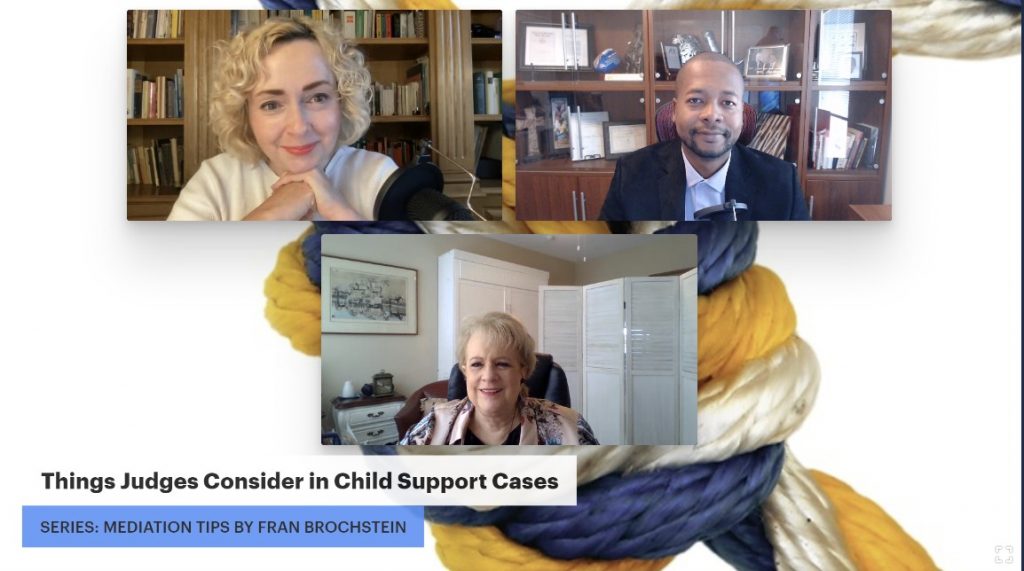Things Judges Consider in Child Support Cases
Fran Brochstein of https://www.familylaw4u.com joined Natalia Olowska-Czajka and Mac Pierre-Louis of https://olowskapierre.com to discuss top things judges consider in child support cases.
{1} Foundationally there are three types of child support cases:
{a} establishment of child support (i.e., when it is first adjudicated - as in a paternity case or any claim for child support)
{b} modification case (where child support is already adjudicated or established in the MSA (Mediated Settlement Agreement) and one of the parties attempt to change the amount $$)
{c} enforcement case (when child support has not been paid and there is a phase of making the obligor to pay){2} Different factors influence child support adjudication or enforcement and they rank from the child’s needs to the parent’s net income (which are statutory). Others derive from judicial practice and life experience, such as the obligor’s standard of living or content shared on social media, such as photos displaying expensive exotic travel, fancy watches or brand-new cars, etc.
{3} In enforcement cases, factors judges likely consider include payment history and balance of arrears. The obligor’s credibility is highly scrutinized. Too often obligors have been cited to hide assets under other persons’ names so as not to come clean on his or her child support responsibilities.
Watch here on YouTube: https://youtu.be/79uKGeDwQjQ
LINKS: https://statutes.capitol.texas.gov/Docs/FA/htm/FA.154.htm
Sec. 154.061. COMPUTING NET MONTHLY INCOME. (a) Whenever feasible, gross income should first be computed on an annual basis and then should be recalculated to determine average monthly gross income.
(b) The Title IV-D agency shall annually promulgate tax charts to compute net monthly income, subtracting from gross income social security taxes and federal income tax withholding for a single person claiming one personal exemption and the standard deduction.
Added by Acts 1995, 74th Leg., ch. 20, Sec. 1, eff. April 20, 1995.
Sec. 154.062. NET RESOURCES. (a) The court shall calculate net resources for the purpose of determining child support liability as provided by this section.
(b) Resources include:
(1) 100 percent of all wage and salary income and other compensation for personal services (including commissions, overtime pay, tips, and bonuses);
(2) interest, dividends, and royalty income;
(3) self-employment income;
(4) net rental income (defined as rent after deducting operating expenses and mortgage payments, but not including noncash items such as depreciation); and
(5) all other income actually being received, including severance pay, retirement benefits, pensions, trust income, annuities, capital gains, social security benefits other than supplemental security income, United States Department of Veterans Affairs disability benefits other than non-service-connected disability pension benefits, as defined by 38 U.S.C. Section 101(17), unemployment benefits, disability and workers’ compensation benefits, interest income from notes regardless of the source, gifts and prizes, spousal maintenance, and alimony.
(c) Resources do not include:
(1) return of principal or capital;
(2) accounts receivable;
(3) benefits paid in accordance with the Temporary Assistance for Needy Families program or another federal public assistance program; or
(4) payments for foster care of a child.
(d) The court shall deduct the following items from resources to determine the net resources available for child support:
(1) social security taxes;
(2) federal income tax based on the tax rate for a single person claiming one personal exemption and the standard deduction;
(3) state income tax;
(4) union dues;
(5) expenses for the cost of health insurance, dental insurance, or cash medical support for the obligor’s child ordered by the court under Sections 154.182 and 154.1825; and
(6) if the obligor does not pay social security taxes, nondiscretionary retirement plan contributions.
(e) In calculating the amount of the deduction for health care or dental coverage for a child under Subsection (d)(5), if the obligor has other minor dependents covered under the same health or dental insurance plan, the court shall divide the total cost to the obligor for the insurance by the total number of minor dependents, including the child, covered under the plan.
(f) For purposes of Subsection (d)(6), a nondiscretionary retirement plan is a plan to which an employee is required to contribute as a condition of employment.
Added by Acts 1995, 74th Leg., ch. 20, Sec. 1, eff. April 20, 1995. Amended by Acts 1995, 74th Leg., ch. 751, Sec. 41, eff. Sept. 1, 1995.
Amended by:
Acts 2007, 80th Leg., R.S., Ch. 363 (S.B. 303), Sec. 1, eff. September 1, 2007.
Acts 2007, 80th Leg., R.S., Ch. 620 (H.B. 448), Sec. 1, eff. September 1, 2007.
Acts 2009, 81st Leg., R.S., Ch. 87 (S.B. 1969), Sec. 9.001, eff. September 1, 2009.
Acts 2009, 81st Leg., R.S., Ch. 767 (S.B. 865), Sec. 4, eff. June 19, 2009.
Acts 2009, 81st Leg., R.S., Ch. 834 (S.B. 1820), Sec. 1, eff. September 1, 2009.
Acts 2009, 81st Leg., R.S., Ch. 1118 (H.B. 1151), Sec. 1, eff. September 1, 2009.
Acts 2011, 82nd Leg., R.S., Ch. 91 (S.B. 1303), Sec. 9.001, eff. September 1, 2011.
Acts 2011, 82nd Leg., R.S., Ch. 932 (S.B. 1751), Sec. 1, eff. September 1, 2012.
Acts 2013, 83rd Leg., R.S., Ch. 1046 (H.B. 3017), Sec. 1, eff. September 1, 2013.
Acts 2015, 84th Leg., R.S., Ch. 1150 (S.B. 550), Sec. 11, eff. September 1, 2018.




